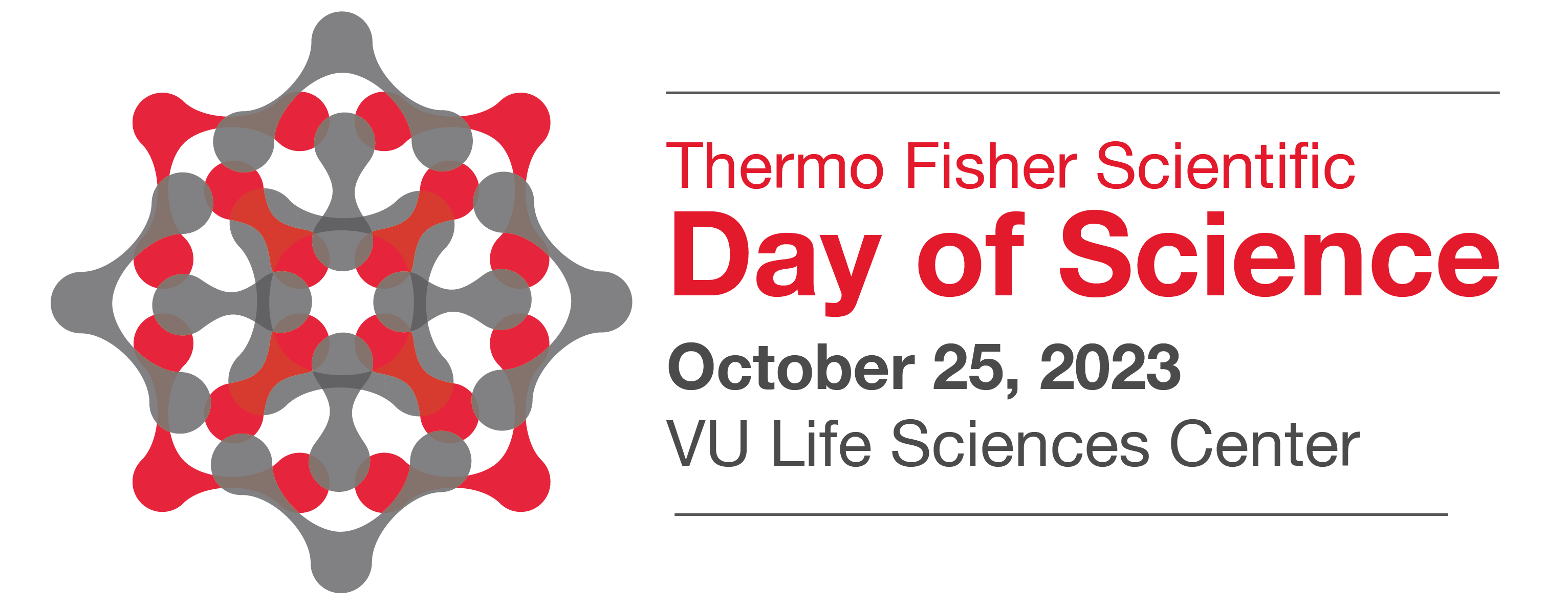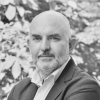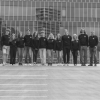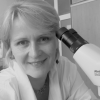

Day of Science 2023
The world leader in serving science cordially invites you to the annual event – Thermo Fisher Scientific Day of Science 2023.
Day of Science is an event that brings together scientists and researchers to discuss a wide range of technologies and solutions for life sciences.



WHEN
Wednesday,
October 25, 2023
WHERE
VU Life Sciences Center
Saulėtekio av. 7, Vilnius
See you in:


Celebrate 70 Years of DNA Progress.
Join us as we celebrate continuing breakthroughs and explore resources to learn, thrive and be inspired. Cheers to innovators like you!
Let‘s discover what‘s next together.
Learn more on thermofisher.com.
Keynote Speakers
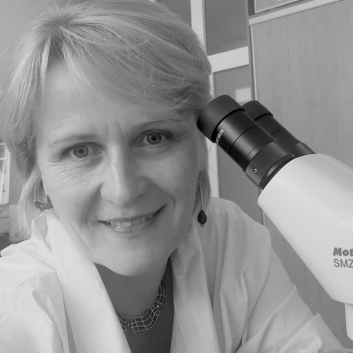
Rasa Bernotienė, PhD
Nature Research CentreTITLE: What DNA Research Can Tell Us About a Single Mosquito?
A simple mosquito that annoys us on a summer evening can tell us a lot about the processes taking place in nature, if we ask the right questions and correctly apply the DNA research methods. The advent of PCR and sequencing has greatly helped in explaining the processes taking place in the ecosystem even studying only one of the components, such as the simple mosquito. Now we can discover not only mosquito species, but also where it flew from, where its ancestors came from, what the mosquito ate for lunch, how long ago it was, how the creature that was for the mosquito lunch felt, and what the mosquito had eaten before it got its last lunch, is the mosquito feeling well at the moment, maybe it can’t reproduce anymore, what threat to our health this mosquito poses? We will try to answer all these questions using DNA research methods

Greta Butkienė, PhD
National Cancer InstituteTITLE: Mesenchymal Stem Cells: Taxi for Efficient Delivery of Theranostic Agents
Currently, various nanoparticles are investigated to fight cancer and significantly improve patient outcomes. There has been a lot of research efforts devoted for theranostic nanomaterials, which could be used for both cancer diagnosis and treatment. Despite great achievements in nanotechnology, insufficient delivery of nanoparticles to the tumours remains a significant barrier, which limits their application in medicine. To address this issue, we explore human skin mesenchymal stem cells (MSCs) as nanoparticle delivery vehicles. MSCs have anti-tumour and immunomodulatory properties as well as the ability to migrate towards cancer cells due to chemoattractant gradient and are involved in wound healing. In our work we combine theranostic nanoparticles with tumour specific transportation using MSCs to create a novel treatment method for cancer.
Prof. Rolandas Meškys
VU Life Sciences CenterHead of the Department of Molecular Microbiology and Biotechnology

Prof. Rolandas Meškys
VU Life Sciences CenterTITLE: DNA 70: A Non(un,in)comprehensive Review
In 1953, James Watson and Francis Crick described the double-helix structure of deoxyribonucleic acid (DNA). Also, they embraced the idea that genes contained a code that expresses information. That changed our view of life irreversibly. This presentation traces how these ideas entered biological thinking, highlights the key DNA-related and DNA-based technologies as well as the latest developments in the field and provides a look into the future of nucleic acids entering our life.

Jorūnė Sakalauskaitė, PhD
Vilnius UniversityTITLE: Palaeoproteomics: Past, Present & Future of Ancient Protein Research
In the last decades ancient biomolecule research has revolutionized the science of archaeology and palaeontology, uncovering even the smallest details from the past. The interest keeps growing, but how much more is there to explore? And what can we learn from tiny archaeological artefacts that for so long were neglected?
In this seminar I will present a brief history of ancient biomolecule research, with a special focus on ancient protein studies, known as palaeoproteomics. Proteins preserve better than DNA and may be recovered in samples over millions of years. I will aim to show a diversity of applications that can help us to better understand our environment, human practices, prehistoric societies and… perhaps spur ideas on palaeo- inspired innovations. The key message is simple – palaeoproteomics may allow us to look far back in time, as long as we move forward.
Sigitas Šulčius, PhD
Nature Research Centre (Vilnius), Israel Institute of TechnologySr. Researcher, Postdoctoral Fellow at the Technion

Sigitas Šulčius, PhD
Nature Research Centre (Vilnius), Israel Institute of TechnologyTITLE: Viral Reshuffling of Microbial Ecosystems
To understand the aquatic ecosystems, we must begin by analyzing its many individual processes one at a time. Among the numerous and diverse microbial interactions occurring in nature, the role of viruses in structuring host population dynamics, reshuffling community composition and cycling of energy and matter remains, to a large extent, a mystery. By using an established virus-host model systems for ecologically relevant cyanobacteria, which forms annually reoccurring harmful blooms in brackish and freshwater environments, I will shed light on the potential of viruses to influence various components of the planktonic community and to modify the overall functioning of microbial food web. I will discuss these results in the context of water quality, ecosystem services and human health. Only by understanding how each piece in this puzzle of multiple microbial interactions responds to each other can we reliably obtain an integrated picture of the functioning of our ecosystems.

Lukas Taujenis, PhD
Thermo Fisher ScientificTITLE: New Chromatography & Mass Spectrometry Research Center in Vilnius
Here I introduce Chromatography & Mass Spectrometry Research Center (CMSRC) in Vilnius. We are developing novel LC-MS products and solutions for analytical sciences community.
Find out how Thermo Scientific µPAC™ Neo HPLC columns can help you uncover more about your proteome sample. Learn how monodisperse particles ProPac™ 3R technology can provide you reproducibility, resolution, and robustness for intact proteins. Get familiar with LC MSn spectral libraries, and how to rely on your big LC-MS/MS data sets.
All of that and many more research projects are currently being executed in growing Vilnius Chromatography & Mass Spectrometry center, which is one of the most instrumentally advanced in the region.

iGem Vilnius Team
Vilnius-Lithuania iGEM 2023TITLE: Vilnius-Lithuania iGEM Project Exullose: Unlocking the Potential of Biomaterials
This year Vilnius-Lithuania iGEM team focused on work with cellulose, a compound commonly associated with plants, which is also naturally synthesized by bacteria of the Komagataeibacter genus. Bacterial cellulose is remarkable for its high purity, making it a desirable polymer for biomedical applications. However, it still has some drawbacks as an ideal biomaterial, as it is difficult to functionalize and modify. Therefore, with the Exullose project, we aim to develop a synthetic biology tool for bacterial cellulose composition modification. This concept has been shown to work by designing bacterial cellulose-chitosan polymer. For further validation, we produced indigo-dyed bacterial cellulose and a potential bioplastic composite of bacterial cellulose and polyhydroxybutyrate.
Meet 2023 iGem Vilnius team members:
Matas Rarivanas, Team Lead
Marija Duchovskytė, Lab Lead
Augustė Stankevičiūtė, Lab member
Lunch-on Session Speakers

Gintarė Gervaitytė
Thermo Fisher ScientificTITLE: Exploring the Possibilities of Loop-Mediated Isothermal Amplification
In the face of the rising prevalence of infectious diseases, the need for rapid testing has never been more important. Technologies like Loop-mediated isothermal amplification can be a great solution for the fast and simple detection of infectious diseases. LAMP is a method used for DNA amplification under isothermal conditions that utilizes a DNA polymerase with strong strand displacement activity, such as Bst DNA polymerase. Because of the method‘s simplicity and rapidity, it has become a valuable technology for on-the-spot diagnostics and can be adapted to create molecular tests suitable for point-of-care applications.

Maria Hidesand
Thermo Fisher Scientific (Sweden)TITLE: Pipetting Best Practices
Of all the factors that contribute to the performance of a pipette, the most critical ones are the skill & expertise of the operator. Are you pipetting different liquids? Are you interested in improving reproducibility of your assays? With this Pipetting Best Practice seminar we will go through the different pipetting techniques and guide you through the recommendations of how to pipette different liquids. There are several factors that can affect the accuracy of pipetting and we will give you quick tips and tricks to achieve better accuracy and how to prevent cross contamination. If you feel pain in your thumb and wrist while pipetting, Thermo Fisher Scientific offers a lot of ergonomics tools to minimize repetitive strain injuries. If you want to learn more about pipetting, please join us at this session and visit our booth.

Andreas Koch
Thermo Fisher Scientific (Germany)TITLE: PCR Clean Up, Size Selection and Green Dynabeads
Do you want to do DNA/RNA/Protein and cell extraction with only one instrument? You want to have an open platform? Kit independent? With heating and cooling? Easy to use software for all applications? To know more about PCR Clean up and size selection and green Dynabeads. If so or only some parts of it, we have the solution for it. The new KingFisher APEX DX gives all these applications with only one instrument, one software and a variety of kits for your choice. You can control each step of the extraction process by software and fine tune it to your needs. If you want to know more about so join us in the lunch session and visit our booth.

Helle Kowalski
Thermo Fisher Scientific (UK)TITLE: Biological Safety Cabinets – Focus on Safety
When on the search for a new Biological Safety Cabinet it can be difficult to know what to look for and why. This presentation will focus on good practices when working in a Biological Safety Cabinet and what goes on behind the scenes in a cabinet, the HEPA filters, the airflows, and the sensor systems that keeps both you and your samples safe. A section will be dedicated to the EN12469 and the tests that must be preformed to ensure the cabinet is functional from day 1.

Lars Mortensen
Thermo Fisher Scientific (Denmark)TITLE: Sample Protection: Optimizing the Layout, Capacity, and Design of Your Cold Storage
Let’s discuss safe sample protection during cold storage, looking at how to optimize the preservation of your samples, in terms of equipment properties, sample containment, support systems, plus other key external factors.
Your cold storage equipment, whether it is a laboratory refrigerator or freezer, ULT or LN2 cryogenic freezer, should be considered a safety device in place to protect what’s stored in it. Perfect sample storage is not just determined by the storage unit itself but also by a multitude of other components, external factors and processes.
Let’s talk about Optimizing the layout, capacity, and design of your cold storage equipment, the role of support systems in keeping your sample safe, how maintenance, timely care, lab layout and organization contribute to sample protection and important performance criteria, such as cost of ownership, ergonomics, user safety and sustainability.
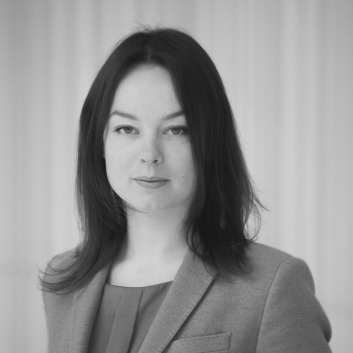
Marija Navickaitė
Thermo Fisher ScientificTITLE: Evolution of Phusion DNA Polymerases
PCR has revolutionized modern molecular biology, but its success would not be possible without the advancements in DNA polymerases. The initial polymerase used in PCR reactions was thermolabile, requiring replenishment in every cycle, making it a slow and monotonous process. Fortunately, modern thermostable and fast polymerases now offer accurate results, optimal performance, and streamlined workflows. Gain insight into the evolution of Phusion DNA polymerase technology and learn how this enzyme was improved during the last 20 years to make it the most suitable polymerase for various high fidelity and challenging PCR applications.

Pierre Le Ninan
Thermo Fisher ScientificTITLE: Flow Cytometry as You‘ve Never Seen it
The Invitrogen Attune CytPix Flow Cytometer integrates acoustic focusing and a high-speed brightfield camera for simultaneous high-throughput flow cytometry and detailed brightfield imaging. Automated image analysis converts event features into extended parameters, enhancing standard flow data. Flow cytometry faces challenges in standardization due to varied sample preparation, user uncertainty, biological differences, and instrument settings. Diverse user gating strategies further contribute to data variability. Reliable standardization is essential for reproducible results and valid research conclusions.
Imaging-enhanced flow cytometers, like the Attune CytPix, enable real-time sample visualization, allowing users to refine gating strategies and provide clear, documented evidence for research publications. Direct visual confirmation of events reduces data ambiguity and user-dependent variations, ensuring robust, quantitative analyses at the single-cell level.
Robertas Žilinskas
Thermo Fisher ScientificApplication Scientist, Chromatography & Mass Spectrometry

Robertas Žilinskas
Thermo Fisher ScientificTITLE: Good Laboratory Practices for Proteomics Workflows
Proteomics is the study of all the proteins in a biological system, aiming to understand their functions and roles. This market size is ever growing field which is expected to grow further with increasing rate of clinical diagnostics and drug discoveries.
Thanks to technological improvements of mass spectrometry, proteomics reached high sensitivity, accuracy and high throughput across multiple conditions with less sample than western blotting and no antibodies needed.
However, with great benefits comes great responsibility. Failed clinical trials may cost additional 0.8-1.4 bn USD per company as only ~30% of candidate drugs advance to phase III trials.
For this reason, implementation of good laboratory practice is essential to avoid incomparable results, long troubleshooting phases, rejected publications and unknown status of the experiment.
Find out more about QC tools and design valuable to implement in proteomics workflow such as reference materials, system suitability test, control charts troubleshooting ideas and more.
Program
- 08:30-16:00 1st floor
-
Registration and Welcome coffee, tea
- 09:00-16:00 1st floor
-
Exhibition
- 09:30 R106
-
Conference Opening
- 09:30-10:10 R106
-
DNA 70: a Non(un,in)Comprehensive Review
Prof. Rolandas Meškys, VU Life Sciences Center
- 10:10-10:50 R106
-
Mesenchymal Stem Cells: Taxi for Efficient Delivery of Theranostic Agents
Greta Butkienė, PhD, National Cancer Institute
- 10:50-11:30 R106
-
New Chromatography & Mass Spectrometry Research Center in Vilnius
Lukas Taujenis, PhD, Thermo Fisher Scientific
- 11:30-13:00 1st floor
-
Lunch
- 12:00-13:00
-
Lunch-on Seminar in Parallel
- 12:00-12:30 R106
-
Good Laboratory Practices for Proteomics Workflows
Robertas Žilinskas, Thermo Fisher Scientific
- 12:00-12:30 R101
-
Exploring the Possibilities of Loop-mediated Isothermal Amplification
Gintarė Gervaitytė, Thermo Fisher Scientific
- 12:00-12:30 R102
-
Pipetting Best Practices
Maria Hidesand, Thermo Fisher Scientific (Sweden)
- 12:00-12:30 R103
-
Sample Protection: Optimizing the Layout, Capacity, and Design of Your Cold Storage
Lars Mortensen, Thermo Fisher Scientific (Denmark)
- 12:30-13:00 R106
-
Evolution of Phusion DNA Polymerases
Marija Navickaitė, Thermo Fisher Scientific
- 12:30-13:00 R101
-
PCR Clean Up, Size Selection and Green Dynabeads
Andreas Koch, Thermo Fisher Scientific (Germany)
- 12:30-13:00 R102
-
Flow Cytometry as You‘ve Never Seen it
Pierre Le Ninan, Thermo Fisher Scientific
- 12:30-13:00 R103
-
Biological Safety Cabinets – Focus on Safety
Helle Kowalski, Thermo Fisher Scientific (UK)
- 13:00-13:40 R106
-
Viral Reshuffling of Microbial Ecosystems
Sigitas Šulčius, PhD, Nature Research Centre, Israel Institute of Technology
- 13:40-14:10 R106
-
Vilnius-Lithuania iGEM Project Exullose: Unlocking the Potential of Biomaterials
Matas Rarivanas, Marija Duchovskytė, Augustė Stankevičiūtė, Vilnius-Lithuania iGEM 2023
- 14:10-14:30 1st floor
-
Coffee break
- 14:30-15:10 R106
-
What DNA Research Can Tell about Single Mosquito?
Rasa Bernotienė, PhD, Nature Research Centre
- 15:10-15:50 R106
-
Palaeoproteomics: Past, Present & Future of Ancient Protein Research
Jorūnė Sakalauskaitė, PhD, Vilnius University
Registration
Participation in the event is free of charge. Due to limited availability, we kindly request that you complete your registration by October 23, 2023, or until all available slots are filled. Your prompt registration is appreciated.
Exhibition
During the Day of Science you are welcome researchers, scientists, and lab professionals who seek to stay at the forefront of scientific discovery and laboratory efficiency. Our cutting-edge exhibition showcasing the latest Thermo Fisher‘s advancements in the world of life sciences and laboratory equipment.
This dynamic event features a wide array of exhibition stalls, each highlighting key aspects of modern laboratory work in those areas:
- Molecular Biology: Sample Preparation, PCR reagents and equipment, such as E-Gel Power Snap Electrophoresis System
- General laboratory products for liquid handling, sample storage and Biological safety cabinets
- Protein Analysis Reagents and products
- Fisher Scientific Channel as your scientific marketplace
- For the 1st time: Chromatography and Mass Spectrophotometry solutions
- Molecular Biology: Sample Preparation, PCR reagents and equipment, such as E-Gel Power Snap Electrophoresis System.
- General laboratory products for liquid handling, sample storage and Biological safety cabinets.
- Protein Analysis Reagents and products
- Fisher Scientific Channel as your scientific marketplace
- For the 1st time: Chromatography and Mass Spectrophotometry solutions.
Venue

Vlnius University
Life Sciences Center
Saulėtekio av. 7, Vilnius

Thermo Fisher Scientific
Thermo Fisher Scientific
Thermo Fisher Scientific Inc. is the world leader in serving science. Our Mission is to enable our customers to make the world healthier, cleaner and safer. Whether our customers are accelerating life sciences research, solving complex analytical challenges, increasing productivity in their laboratories, improving patient health through diagnostics or the development and manufacture of life-changing therapies, we are here to support them. Our global team delivers an unrivaled combination of innovative technologies, purchasing convenience and pharmaceutical services through our industry-leading brands, including Thermo Scientific, Applied Biosystems, Invitrogen, Fisher Scientific, Unity Lab Services, Patheon and PPD.
Thermo Fisher Scientific Inc. is the world leader in serving science. Our Mission is to enable our customers to make the world healthier, cleaner and safer. Whether our customers are accelerating life sciences research, solving complex analytical challenges, increasing productivity in their laboratories, improving patient health through diagnostics or the development and manufacture of life-changing therapies, we are here to support them. Our global team delivers an unrivaled combination of innovative technologies, purchasing convenience and pharmaceutical services through our industry-leading brands, including Thermo Scientific, Applied Biosystems, Invitrogen, Fisher Scientific, Unity Lab Services, Patheon and PPD.
